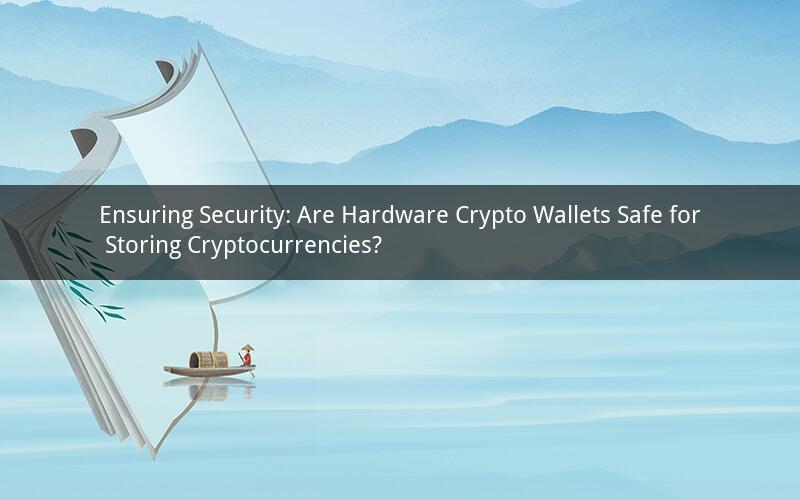
Introduction:
In the rapidly evolving world of cryptocurrencies, the need for secure storage solutions has become paramount. Among the various options available, hardware crypto wallets have gained popularity due to their enhanced security features. However, concerns regarding their safety still persist. This article delves into the question of whether hardware crypto wallets are truly safe for storing cryptocurrencies.
1. Understanding Hardware Crypto Wallets:
Hardware crypto wallets are physical devices that provide offline storage for cryptocurrencies. They are designed to protect digital assets from online threats, such as hackers and malware. Unlike software wallets, which store private keys on a computer or smartphone, hardware wallets store private keys in a secure hardware chip.
2. Security Features of Hardware Crypto Wallets:
Hardware crypto wallets incorporate several security features to ensure the safety of stored cryptocurrencies. Here are some key aspects:
a. Physical Security: Hardware wallets are physical devices, making them immune to online attacks. They are typically made of robust materials, such as metal or plastic, to prevent physical tampering.
b. Secure Chip: The private keys are stored in a secure hardware chip, which is resistant to various types of attacks, including side-channel attacks and brute-force attacks.
c. Multi-Factor Authentication: Many hardware wallets require multi-factor authentication, such as a PIN code and a unique passphrase, to access the wallet. This adds an additional layer of security, ensuring that only authorized individuals can access the stored cryptocurrencies.
d. Cold Storage: Hardware wallets use cold storage, which means they are not connected to the internet. This eliminates the risk of remote attacks and ensures that the private keys remain secure.
3. The Safety of Hardware Crypto Wallets:
While hardware crypto wallets offer robust security features, it is important to understand their limitations and potential risks. Here are some factors to consider:
a. Physical Security Risks: Hardware wallets are physical devices, and they can be lost, stolen, or damaged. It is crucial to store them in a safe and secure location, away from prying eyes.
b. Manufacturer's Security: The safety of a hardware wallet also depends on the security practices of its manufacturer. It is essential to choose reputable and established brands that prioritize security and have a proven track record.
c. Software Vulnerabilities: Although hardware wallets are immune to online attacks, they can still be vulnerable to software vulnerabilities. It is crucial to keep the firmware of the wallet updated to mitigate any potential risks.
4. Best Practices for Using Hardware Crypto Wallets:
To maximize the safety of using hardware crypto wallets, it is important to follow these best practices:
a. Store the Recovery Seed Safely: The recovery seed is a critical component of a hardware wallet, as it allows you to restore your wallet in case of loss or damage. Ensure that you store the recovery seed in a secure and private location.
b. Use Strong Passphrases: When setting up a hardware wallet, use strong and unique passphrases. Avoid using easily guessable passwords and consider using passphrase managers to securely store and manage your passphrases.
c. Regularly Update Firmware: Keep the firmware of your hardware wallet updated to ensure that any potential vulnerabilities are patched promptly.
5. Alternatives to Hardware Crypto Wallets:
While hardware crypto wallets offer enhanced security, they may not be suitable for everyone. Here are some alternative options:
a. Software Wallets: Software wallets, such as mobile and desktop wallets, provide convenience and ease of access. However, they are more susceptible to online threats. It is crucial to use reputable software wallets and follow best security practices.
b. Paper Wallets: Paper wallets are another offline storage option. They involve printing private and public keys on paper. While they are highly secure, they can be easily damaged or lost.
Conclusion:
In conclusion, hardware crypto wallets offer a high level of security for storing cryptocurrencies. Their physical nature, secure chip, and multi-factor authentication make them a reliable choice. However, it is essential to understand the potential risks and follow best practices to ensure the safety of your digital assets. Whether or not a hardware crypto wallet is suitable for you depends on your individual needs and risk tolerance.
Questions and Answers:
1. Q: Can a hardware crypto wallet be hacked?
A: While hardware crypto wallets offer robust security, they are not entirely immune to hacking. However, the likelihood of a successful hack is significantly lower compared to software wallets.
2. Q: Can I use a hardware crypto wallet for any cryptocurrency?
A: Yes, most hardware crypto wallets support a wide range of cryptocurrencies. However, it is important to check the compatibility of the wallet with the specific cryptocurrencies you intend to store.
3. Q: What should I do if I lose my hardware crypto wallet?
A: If you lose your hardware crypto wallet, you can recover your cryptocurrencies using the recovery seed. Ensure that you have securely stored the recovery seed in a private location.
4. Q: Can a hardware crypto wallet be used for online transactions?
A: No, hardware crypto wallets are designed for offline storage. However, they often come with a built-in interface that allows you to sign transactions using the hardware wallet while keeping your private keys secure.
5. Q: Are all hardware crypto wallets equally secure?
A: No, the level of security can vary among different hardware wallets. It is crucial to choose reputable brands with a strong track record in security and positive user reviews.